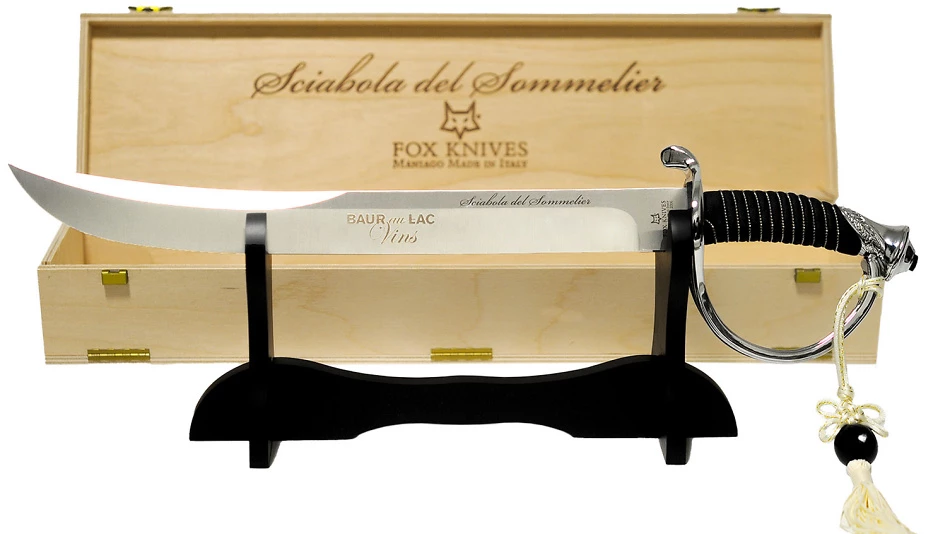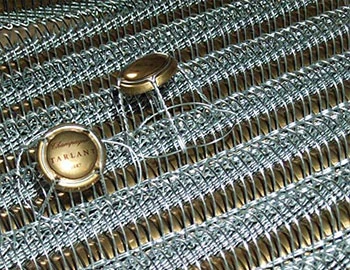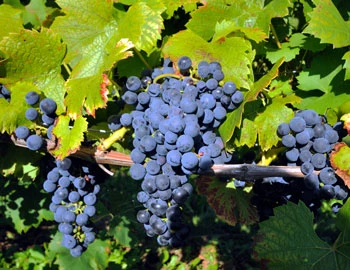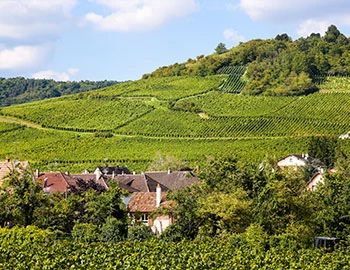
Tarlant La Vigne Royale Brut Nature 2007
AOC Champagne, (Pinot Noir), 750 ml

| Grape variety: | Pinot noir |
| Producer: | Tarlant |
| Origin: | France / Champagne |
Description
The nose reveals the typical aromas of the Pinot Noir grape with notes of sweet, red fruits such as ripe raspberries and cherries, accompanied by delicate hints of dried flowers. The palate is opulent and complex, with a harmonious interplay of fruit and spice. A subtle hint of liquorice, fresh herbs and roasted almonds add complexity and a unique character. The finish is long-lasting and leaves an elegant, mineral aftertaste. This versatility and depth make this champagne an excellent accompaniment to food.
Celebrate the Art of Sabring!

With its elegant design, this champagne sabre is not only an impressive eye-catcher at any celebration and an indispensable tool for stylish sabering, but also the perfect gift for all passionate sparkling wine lovers.
Attributes
| Origin: | France / Champagne |
| Grape variety: | Pinot noir |
| Drinking temperature: | 8 to 10 °C |
| Vinification: | bottle fermentation, fermentation in wooden barrel |
| Maturation: | on the yeast, bâtonnage |
| Maturation duration: | 120 months |
| Volume: | 12.0 % |
| Note: | Contains sulphites |
Tarlant
The Tarlant family can look back on a long family history, one that can be traced back to 1687. For almost three and a half centuries they have devoted themselves to viticulture in the Marne Valley in the Champagne region. But it was only after World War I that the first hugely successful Champagne Tarlant was created. Today, brothers Jean-Mary and Benoît operate the family-owned company.
With a total of 14 hectares spread over 55 plots, the winery is very small compared to other Champagne houses. Tarlant is a real insider tip, featured on the wine list of some of the world's most prestigious restaurants, and it was not easy for Baur au Lac Vins to come by a few bottles. These sparkling wines are unusual, but all the more fascinating for it.
Vigne d'Antan, Vigne d'Or and La Vigne Royale belong to the winery's limited premium range. The grapes each come from a particular location. The Chardonnay vines for the Vigne d'Antan are authentic, meaning they are ungrafted. The Vigne d'Or is made from 100% Pinot Meunier, which is really unusual in the Champagne region, and can be described as a rarity. La Vigne Royale is a pure Pinot Noir.
The hand-picked grapes are gently pressed in the traditional basket press. The fermentation and maturation of the basic wines are carried out in barrels. Tarlant attaches great importance to a particularly long bottle ageing on the yeast, so the flavours can fully develop. This can easily take seven to ten years. These Champagne wines are always dry and receive little or no dosage.
Even for the Champagne connoisseur, these hidden gems will make for a most unusual discovery!

Pinot noir
Blueprint of the terroir
No other variety expresses its terroir as precisely as Pinot noir. It is a sensitive, fragile grape. But when it succeeds, it gives the world some of its very greatest wine plants. It especially excels in Burgundy, where it has been cultivated for at least 700 years. Even in the middle ages, it was considered so precious that it was kept separate from other grapes so as to not diminish its value. The finest examples are delicate and fragrant with aromas of cherries and red berries. With maturity, notes of forest floor, leather and truffles enter as well. An irresistible fruity sweetness still shines through, even after several decades. The Pinot noir does well in cool locations: in Switzerland and in Germany, where it is known as Blauburgunder and Spätburgunder respectively; in Alsace and in South Tyrol, in Oregon, New Zealand and Tasmania. Not least, it yields fantastic champagnes. It is a wonderful culinary companion. With its soft tannins and charming bouquet, it meshes with everything, from Güggeli and cheeses to fried fish.

France
France – Philosophy in a bottle
According to French philosophy, wine should be an expression of the soil and climate. They use the word “terroir” to describe this. Terroir makes every wine different, and many especially good. French wine is regarded worldwide as an expression of cultural perfection. The French believe that humans are responsible for the quality of the berries, the vine variety for their character, and nature for the quantity. This philosophy can be expressed succinctly as: “the truth is the vineyard, not the man.”


